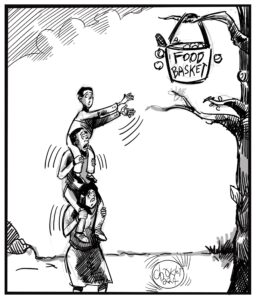GREEN Economy and Environment Minister Collins Nzovu says government will this month commence the issuance of Timber Concession Licenses.
In a statement, Tuesday, Nzovu said, however, that the concession licenses would exclude Mukula timber species in view of the ban.
“The government, through the Ministry, will soon commence issuance of Timber Concession Licenses that were last issued in 2017. The Ministry will, before the end of April 2022, issue and circulate an advertisement in the daily newspapers and other media platforms to invite individuals and entities that would wish to apply for and acquire Timber Concession Licenses. These Concession Licenses will exclude the Mukula timber species in view of the ban imposed by government on the harvest and export of the Mukula timber species. The nation will be informed in due course on the progress made in the new arrangements regarding the harvesting, trade and export of Mukula timber species,” he said.
“The application and issuance of the concession licenses will be done in a transparent, just, accountable and equitable manner, without discrimination for the benefit of all Zambians. Zambians are encouraged to participate and acquire concession licenses as this is part of the empowerment that the New Dawn Government promised the Zambian people.”
He said the Ministry had commenced the process of instituting punitive measures on all concessionaires that were engaged in illegalities such as over-harvesting or non-submission of harvest returns, among others.
“While government strives to protect the forestry resource, the Ministry regrets to note that some concessionaires have not been compliant with the provisions of the law. Therefore, the Ministry, guided by the Forests Act No. 4 of 2015, has commenced the process of instituting punitive measures on all concessionaires that are engaged in illegalities such as over-harvesting or non-submission of harvest returns among others. Arising from the aforementioned measures, the government is confident that more employment and income generation opportunities will be created and the economic well-being of the people will be enhanced. This is a clear demonstration of the transformative leadership of His Excellency, Mr Hakainde Hichilema, the President of the Republic of Zambia. I wish to reiterate the position of the New Dawn Government on the need to continuously engage in meaningful dialogue to ensure we are all moving together. This is the Zambia we want, this is the Zambia we all desire,” Nzovu said.
He said government was in the process of amending the Forest Act No. 4 of 2015 to provide for stiffer penalties and strengthen enforcement mechanisms.
“The Ministry of Green Economy and Environment commissioned an Audit of the Forestry Department and its operations countrywide as part of establishing a baseline and appreciating the challenges experienced over the years. The audit process is currently underway and the nation will be updated on the findings and the way forward. The government is in the process of amending the Forests Act No. 4 of 2015 to provide for stiffer penalties and strengthen enforcement mechanisms. The current Forest Act is weak on penalties leading to unabated illegal activities in the forests which compromise the well – being of the forest ecosystems and diminishes the capacity of forests to provide for future generations,” said Nzovu.
“The amendment of the Forests Act will also empower Zambians to participate in the sub–sector and to encourage value addition to forestry resources at the local and national levels. Through this amendment, the New Dawn Government will establish clear and transparent procedures for Gazettion and Excision (Partial Degazettion) of Protected Forest Areas (Forest Reserves) in order to curtail the disappearance of forests across the length and breadth of the country. Further, the amendment of the Forests Act will provide for Forest Carbon Stock Management and Carbon Trading to complement the Community Forest Management Regulations (S.I. No. 11 of 2018) and Forest Carbon Stock Management Regulations which were enacted in 2018 and 2021 respectively.”







